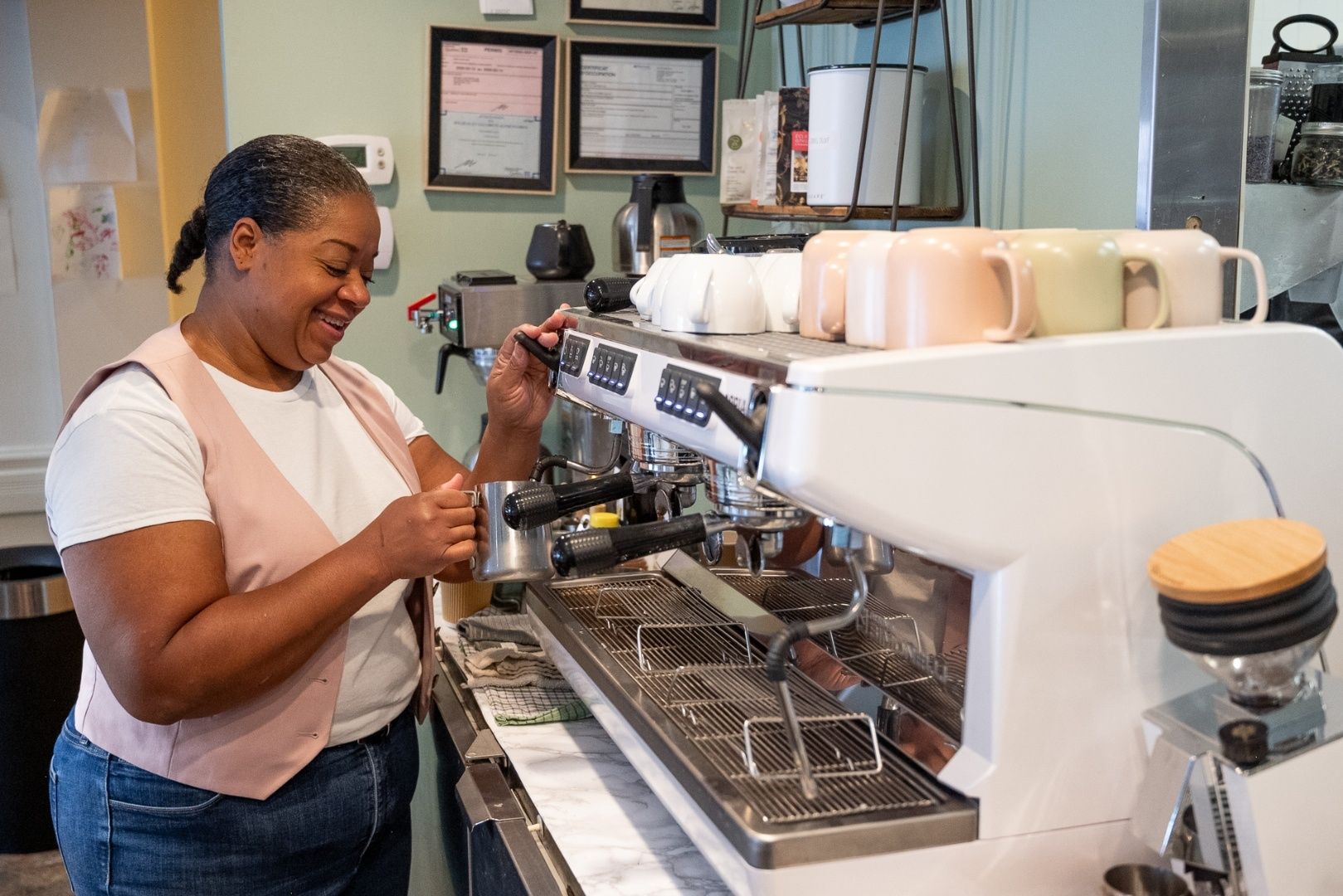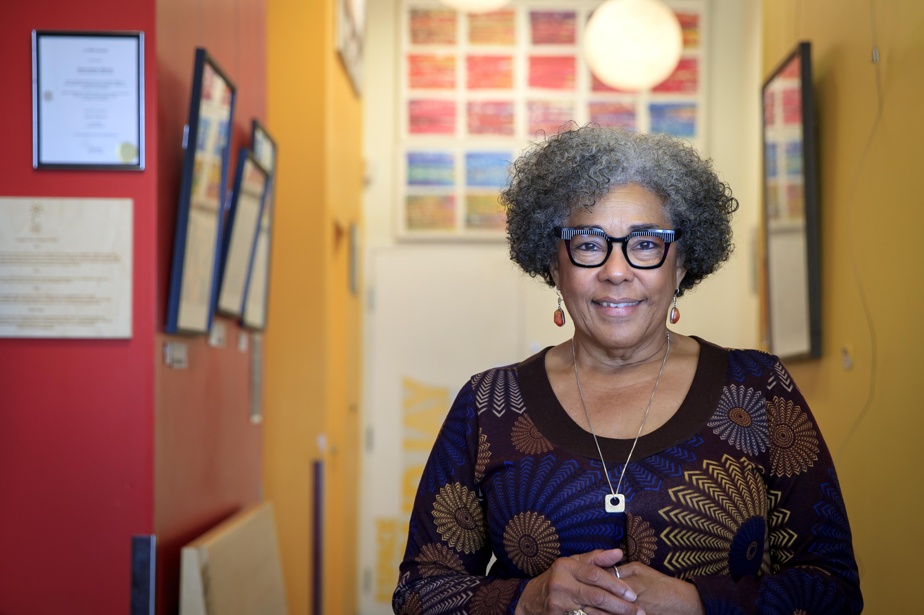With a journey full of obstacles and challenges, Raccoon has cleverly transformed her experiences into a source of inspiration for her young audience. One Saturday evening, very close to Crémazie station, La Converse meets Raccoon at Studio Forge to begin an enriching dialogue on the identity of this rapper and how it pushes him to contribute to the life of his community.
After her recording session, the artist invites us into the studio, where a purple mist envelops us. A deep, pulsating rhythm fills the room, transporting us into the world of hip hop. With words like” You can be a dope, even if you have nothing to sell ”, the rapper tells young people that they can be respected, like “real guys from the hood”, legally and without falling into delinquency. The artist is redefining success and invites listeners to distrust social conventions and to seek their own path. “I embody success by being a young black man from the neighborhoods who makes a living from his lyricism,” he tells us.
Franz Fanon, Black Desire, Shamyr
Racoon, whose real name is Shamyr Daléus-Louis, grew up in the north-east of the city, between the neighborhoods of Montréal-Nord, Rivière-des-Prairies and Pointe-aux-Trembles. Her passion for music and words was cultivated from an early childhood. “I fell into music because I come from a deeply musical family. My big brother raps, and my sister imported the best music from the United States to us. We have been big fans of American hip hop culture for as long as I can remember.” Little by little, French rap aroused the interest of this young artist. “I especially started to be interested in rap when I discovered the committed rap of Kery James And of Youssoupha ”, he tells us.
At the age of 15, Shamyr purchased the album Noir Désir by Youssoupha, a work that left a deep impression on him. “It's the first album I bought with my pocket money, I was very attached to it,” he says. Youssoupha quoted authors like Frantz Fanon in his interviews. Authors, as well as concepts that my father had told me about before. The album touched on topics like black consciousness, black history, the black man's journey, and all of that was at the center of his creative process. I was inspired by his struggles and the way he wrote and perceived rap. I was also educated about hip hop that way. Later, I became interested in Quebec rap.”
“Hearing French rappers quote writers that my father had me read to when I was young created a bond with my parents. I really like to write, and my parents are very literary; so it was a way of presenting rap to them by going through the box of committed rap,” adds the rapper.
“My two parents are still very integrated here,” he says, referring to their arrival from Haiti at a young age. “They showed me the culture here, the culture of my country of origin as well. Above all, they showed me how to move here in Quebec. They prepared me for the white man, but at the same time, they also taught me to love the place where I am and to make it my own, telling me: “You are entitled to your place; we did not pay taxes for nothing,” Shamyr elaborates on his education.
It is therefore based on his childhood and his education, and thanks to his interest in literature and to some writing workshops that he took in his public housing and extracurricular activities that Raccoon began to forge his artistic identity.
“Figui raccoon”
Shamyr's stage name Raccoon is linked to the habits of his teenage years, which were marked by lack of sleep. “It comes from my high school years. When I arrived at school, I had big dark circles. So my friends said to me: “Figui raccoon”, you have the face of a raccoon. It was due to my interest in writing, as I spent nights writing, but also playing video games like Resident Evil, where there is a fictional city, Raccoon City. So it's a link between all these worlds,” explains the rapper, formerly known as Raccity, always referring to Resident Evil and his sleepless nights.
Now 26, Raccoon explains to us that this stage name still represents his rebellious soul just as well. “He is considered harmless, but he can do what he wants. It is one of the only animals whose intelligence has not been put at the service of man,” he adds with a wry smile.
“The goal is to get people's minds and heads moving before they give up.”
While several Montreal rappers specialize in street rap, where women, guns and money occupy their writing, Raccoon instead questions society, its values, its injustices. “Committed rap is a rap that wants to be assertive, with a message to get across. Its aim is to convince or approach a debate, ask a question, push people to think,” explains the artist. Using the words of Kery James, he goes deeper into his point: “The goal is to move minds and heads before glutes move.”
The Montrealer approaches the harsh reality of neighborhoods affected by armed violence. “These days it's shooting shoot, bang bang/J'Can't walk in the wing anymore,” he chants in one of his songs. “When street rappers sing that they're shooting at people, they're dancing anyway. Shoot is Raccoon's perspective, on the other side of the canon. We dance too,” he explains, commenting on the choreography that accompanies the chorus, symbolic of the resilience of his community.
“Excellence is ours”

For the second generation immigrant, the question of identity is central. The artist addresses the issue in his latest album, entitled C00N: The Prophecy. “I was already told that I put in too many syllables, that I rap like a white man,” says Raccoon, referring to the lyrics of his song C00N.
He explains that the term “C00N”, which gives the title to the song and the album, “is the N-word that black people use for other black people to say that they behave like white people, that they are white people pleasers.” Historically, This term, which comes from the word raccoon in English (raccoon), was used by white people to refer pejoratively to black people. This word was later used by blacks to refer to an intruder among them.
“In youth groups, when a young black man or a young black woman starts to 'speak well', they are stripped of their identity, and the person becomes 'white, '” explains Shamyr. This reality saddens him. “I would like to see this kind of label removed: that what I am doing is aimed at white people because I have a slightly more careful writing style... We have difficulty loving each other, in appreciating each other for anything other than negativity,” laments the North Montrealer.
In addressing this question, the committed rapper insists on the fact that “excellence does not belong to whiteness.” “Excellence belongs to us, underlines the rapper, with his hand on his heart. We had great speakers. We had lyricists. The lyricism in rap comes from black culture at its core.” For him, his album is a campaign to convince the community to walk with him.
“Just as I want to criticize members of my community for the boxes we're trying to fit in, it's also important for me to remind them that I love them, that I'm from the same place, and that we share a common bond,” he says. His new collaborator Jackson adds on this subject that the song Mon Flag by Raccoon, produced in collaboration with the rapper Izzy-S, resonated with many young Haitians.
“Talk to a patnè”
For over a year, Raccoon worked as a counsellor in a youth center. This experience was a revelation for him when it came to mental health. “Initially, I wanted to free myself from my own complexes and learn to talk about difficult things, but the more I worked with young people, the more I was around them, the more I conducted workshops, and the more I understood the importance of these discussions.” It is for them that he addresses these questions in his texts.
Raccoon's plays are honest, even when they deal with difficult topics like mental health. He talks openly about his own experience. “My life has not always been easy. My family and I have had our ups and downs, including An armed attack. I have fallen into depression, like many others,” says Raccoon. “It's not true that only white people suffer from mental health problems,” he adds forcefully. A lot of people I knew were suffering from psychological disorders that I didn't know at the time. Some of them were active on the streets and suffered from depression or even the onset of schizophrenia.”
Raccoon has a clear vision for her work. “I talk about my own trials to help young Black people talk about it too. I want to normalize these conversations as much as possible, to break the taboo around mental health in our community.” The artist encourages others to confide and ask for help, as keeping everything to yourself can only lead to distress.
“You can be handsome, talented and sometimes want to die; that's normal,” he says with conviction. But don't keep that to yourself. Talk to a patnè, consult a professional, don't let these toxic thoughts overwhelm you. Because it's when you keep everything inside that it starts to grow and become dangerous.”
“If you like doing ballet, do ballet! ”

To conclude, the rapper puts his speaker hat back on to transmit an inspiring message to Montreal youth: “DO YOU! ” he said passionately. He encourages young people not to follow the crowd, but to follow their own path, no matter what that may be. “If you like doing ballet, do ballet! ”, he insists
“The greatest gift that a black man or a black woman can give is independence of mind. It's very difficult in a mostly white Western world, where the power is theirs,” recognizes Shamyr. “Your experience as an individual is important because I know that when a white person wakes up, he doesn't think about how other white people will perceive him.”
“If you want to rap, rap! Studio recording is only the final step... Being young, I took workshops to write slam and poetry.” It is by giving rap writing workshops that he gives back to young people in the neighborhood. “I want to make the fundamentals of rap accessible to others, as they were for me... I want to recreate the moments I experienced when I was younger, when I went to my writing classes. I'm trying to get back in the habit of writing and, thank goodness, it still works,” he says with a smile.





.avif)

.avif)
.jpg)

